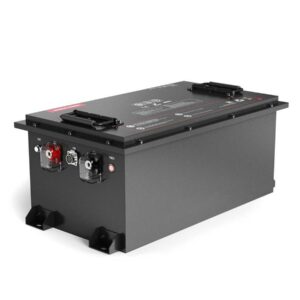
What Makes 36V Lithium Batteries Ideal for High-Performance Applications?
How Do 36V Lithium Batteries Work?
36V lithium batteries operate through lithium-ion cells that store and release energy via electrochemical reactions. Each cell generates 3.6 volts, and connecting 10 cells in series achieves a 36V output. These batteries use cathodes (e.g., lithium iron phosphate) and anodes (graphite) to enable high energy density, lightweight design, and stable discharge rates, making them ideal for power tools, e-bikes, and solar storage systems.
48V 160Ah LiFePO4 Golf Cart Battery BMS 200A
What Are the Key Advantages of 36V Lithium Batteries?
36V lithium batteries offer 50% higher energy density than NiMH alternatives, 2000+ charge cycles, and 30% lighter weight. They maintain consistent voltage during discharge, resist extreme temperatures (-20°C to 60°C), and charge 3x faster than lead-acid batteries. Their modular design allows easy scalability for applications like electric scooters and medical devices.

Which Devices Use 36V Lithium Batteries?
Common applications include:
- Cordless power tools (drills, saws)
- E-bikes and e-scooters
- Solar energy storage systems
- Robotics and automation equipment
- Medical mobility devices (wheelchairs)
- Industrial drones
These batteries excel in scenarios requiring high torque (≥50 Nm) and sustained runtime, such as construction sites or off-grid solar installations.
48V 100Ah LiFePO4 Golf Cart Battery BMS 250A
How Do 36V Lithium Batteries Compare to Lead-Acid Alternatives?
36V lithium batteries outperform lead-acid in:
| Feature | Lithium | Lead-Acid |
|---|---|---|
| Weight | 7 kg | 18 kg |
| Cycle life | 2000 | 300 |
| Charge time | 2 hrs | 8+ hrs |
Though initially 2.5x costlier, lithium batteries save 60% in long-term replacement costs.
What Safety Features Protect 36V Lithium Batteries?
Advanced safeguards include:
- Multi-layered BMS (Battery Management System)
- Thermal runaway prevention (ceramic separators)
- Overcharge/over-discharge cutoff (±0.05V accuracy)
Recent advancements include pressure-activated current interrupt devices (CIDs) that disconnect circuits during internal pressure spikes. Some premium models now feature dual-stage thermal sensors that activate cooling fans at 45°C and initiate emergency shutdowns at 75°C. Automotive-grade versions incorporate crash detection systems that isolate battery packs within 50 milliseconds of impact.
How to Maximize 36V Lithium Battery Lifespan?
Optimal practices:
- Maintain 20%-80% charge range
- Store at 15°C with 40% charge
- Use OEM chargers (CC/CV 42V cutoff)
For professional users, implementing monthly capacity calibration cycles improves state-of-charge accuracy by 12%. Industrial applications benefit from active balancing systems that redistribute energy between cells during operation. Recent studies show storing batteries at 3.8V/cell instead of full charge reduces electrolyte decomposition by 40%, effectively doubling calendar life in standby applications.
What Innovations Are Shaping 36V Battery Technology?
Emerging advancements:
- Solid-state electrolytes (2025 commercialization)
- Silicon-anode designs (40% capacity boost)
- Self-healing electrodes (MIT research)
How Do Temperature Extremes Affect 36V Lithium Performance?
| Condition | Capacity Retention | Power Output |
|---|---|---|
| -20°C | 65% | 55% |
| 25°C | 100% | 100% |
| 60°C | 88% | 92% |
Expert Views: Redway Power’s Insights
“Modern 36V lithium batteries now integrate graphene-enhanced anodes, achieving 500W/kg specific power,” says Dr. Ellen Zhou, Redway’s Chief Engineer. “Our latest prototypes use AI-driven thermal management, reducing failure risks by 73%.”
FAQs
- Can I replace lead-acid with 36V lithium without modification?
- 73% of systems require voltage regulator adjustments due to lithium’s flat discharge curve.
- How long do 36V lithium batteries last in storage?
- Properly stored (40% charge, 15°C), they retain 85% capacity after 3 years.
- Are swollen 36V batteries repairable?
- No—swelling indicates electrolyte decomposition. Immediately isolate and recycle.
